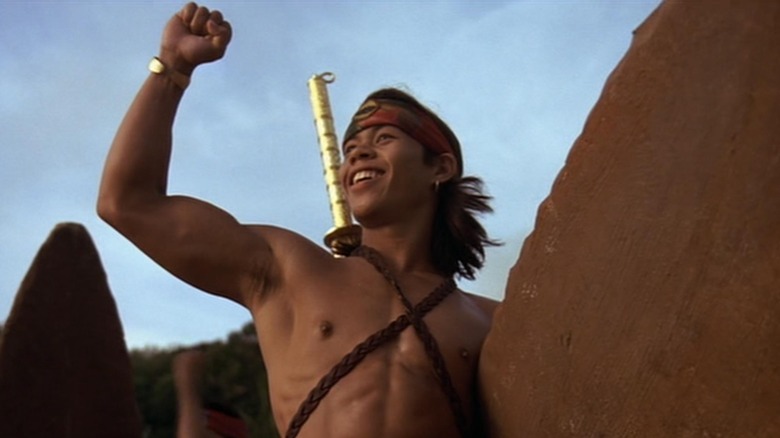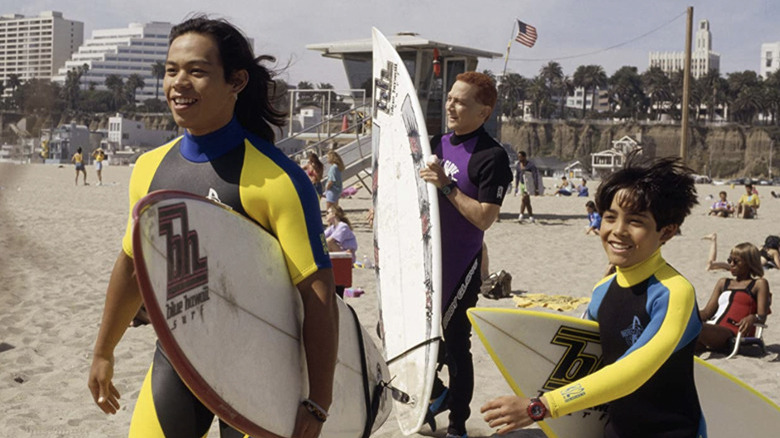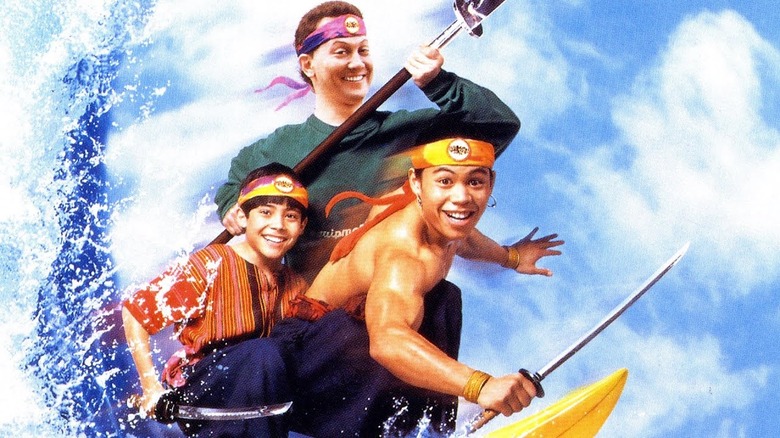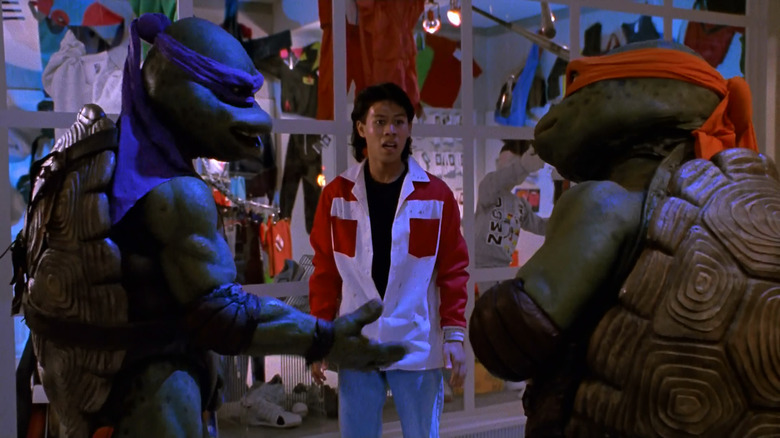Surf Ninjas & Ninja Turtles Actor Ernie Reyes Jr. Faces A New Fight: A Kidney Transplant
Many legendary figures in the realm of entertainment have universal appeal. Basically everyone acknowledges that people like Walt Disney, Lucille Ball, Jim Henson, Mary Shelley, Stan Lee, and Whoopi Goldberg can all be considered legends in their own right. But there are plenty of inspiring individuals out there, both in front of the camera and behind the scenes, that don't get recognized as often as they should. One such person is Ernie Reyes, Jr.
Probably best known for playing Keno, the ass-kicking pizza delivery boy in "Teenage Mutant Ninja Turtles II: The Secret of the Ooze," many don't know that Reyes was actually Donatello's stuntman in the first live-action TMNT film as well. Over the next few decades, he would go on to bring his impressive martial arts skills to "Rush Hour 2," "The Rundown," "Indiana Jones and the Kingdom of the Crystal Skull," and "The Librarians." His stunt work can also be seen in "Avatar," "Alice in Wonderland," and "Act of Valor." But for many children of the '90s, especially the Filipino American ones, they will remember him as the star of "Surf Ninjas" alongside Nicholas Cowan, Rob Schneider, Leslie Neilsen, Tone Loc, Kelly Hu, and Ernie Reyes, Sr.
Kwan-Tsu Dudes!
Aside from teaching us important lessons such as "money can't buy knives," director Neal Israel's 1993 martial arts movie did something many projects in the genre at the time were neglecting to do: Putting an Asian or Asian American character at the center of the narrative. Of course, you had Jackie Chan and Jet Li rising to prominence with the Western audience at the time, but "Double Dragons," "Beverly Hills Ninja," "Mighty Morphin Power Rangers," and the "3 Ninjas" movies are just a few examples of the white savior trope at play in Hollywood martial arts films and television around that time. I mean, for every Chan or Li film released, it seemed like Jean-Claude Van Damme and Steven Segal had two or three on the video store shelf.
But in "Surf Ninjas," young Asian Americans were finally able to see themselves as the heroes. In addition to Dante Basco's iconic portrayal of Rufio in "Hook" two years prior, Filipino Americans could point to the three leads of this movie and be inspired to act, participate in martial arts, surf, or just generally be acknowledged as part of pop culture. (Yes, I said three leads because Rob Schneider is Filipino, too.) In a world where they may have frequently felt otherness (especially if they were like me and grew up in a neighborhood on the East Coast without much of an Asian community), this movie was a great way for them to finally feel seen and reflected in their media.
And Ernie Reyes Jr. was at the center of it all.
A New Fight
In college, when I would meet new Asian American friends who were interested in film or TV, "Surf Ninjas" would inevitably come up and we'd fondly reminisce about watching that movie when we were younger. It was truly a landmark film in Asian American cinema and, like Reyes, it doesn't get as much recognition on the whole as it should.
The star continued to have a career onscreen and in the world of martial arts after his trip to save the fictional country of Patusan in 1993. But over the past six and a half years, Reyes has experienced some challenges due to problems with his kidneys. While undergoing dialysis three times a week, he managed to keep training and teaching in order to provide for his family. Luckily, the California native was able to match with a kidney donor recently and get a transplant in Phoenix, Arizona. However, as just about any American with health issues can tell you, this procedure did not come without a hefty price tag.
According to the GoFundMe set up by the Reyes family in an effort to soften the blow of the massive health bills accumulated by the procedure, the martial artist has barely been able to move. Plus, he'll have to stay in Phoenix for some time before returning home to continue his recovery, where he'll be unable to work for several months.
Representation Is Important
This seems like a topic I keep talking about. Know why? Because representation and diversity in media will forever and always be extremely important. Reyes knows this, too. While speaking to Yahoo Entertainment about the 30 year anniversary of "Teenage Mutant Ninja Turtles II: The Secret of the Ooze," the actor was asked about the terrible acts of racism that have occurred since the COVID-19 pandemic began. He recognized that things need to change all over the place, including in Hollywood and pop culture.
"I don't like to drown in the darkness of things, because that's very easy to do. Instead, I think, 'How can you shine light into moments like this and create change?' Because there's a tremendous amount of changed needed, and so we need heroes: We need people that step up and communicate a message of positivity and light, and represent our culture well.
To think that thirty years ago, I was making 'Sidekicks' and now Disney is doing 'Raya and the Last Dragon' and 'Shang-Chi!' I know that we played an instrumental part to get to this place, and I've developed things, too, that hopefully fit into that world. We work hard to when we get the opportunities to represent our culture well so that people understand. It's an important time, and I definitely know that the story's not over; my mindset is always that the best is yet to come. I'm just very grateful to be alive and to be here."
Obviously, everyone is struggling to some extent due to the general state of the world right now. But if you're willing and able to make a donation to this trailblazer's recovery, it would be great if you could head to the fundraising page to do so. Or as a thank you for his commitment to diversity and representation over the years, please share some links so that other people may donate. With any luck, Ernie Reyes Jr. will be around long enough for a few more generations to thank him for his legendary contributions to the fight for representation in film and television.



